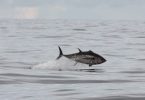Often the subject comes up as to whether sea anglers should keep the fish they catch or return them alive and the ensuing debate can become quite heated so what lies behind this argument that is fundamental to Recreational Sea Angling?
Legally, once anyone catches a fish, by whatever method, that has been legally taken (ie is above the minimum size limit etc), it’s theirs to do with as they please.
And each angler must draw their own line upon where they stand.
If I want to feed my runner bean trench with bass of all sizes, to ensure a good bean crop, who has the right to intervene?
If I want the pleasure of catching mackerel, literally in their hundreds and feed them to the gulls or leave them to rot, that’s down to me.
Right?
I doubt that many would agree that I’d drawn my line in the right place, but ultimately that’s my choice. Isn’t it?
Things get more complicated the further up that line as to what more people would find reasonable.
A young kid catches a 6lb mullet, knocks it on the head, takes it home to show mum, then it goes in the bin.
Is that right, given the excitement that the kid has had from such a remarkable capture, and the need to share that with the person he loves and respects?
After all, it’s just another dead fish.
Right?
OK, what about an older teenager with a potential record breaker?
Is it right to kill a fish, just because there might be a potential club record claim, a gleaming cup at the AGM, or a new reel in it?
Now what about someone who takes a large sting-ray, so that he can get his mate to photograph it in his backyard, and send the picture to an angling magazine or paper?
Should the paper even publish such pictures, encouraging others to do the same?
What about the competition angler, where that dead doggie might just swing a £300 prize?
But it’s when we talk about taking fish for the pot that things get really interesting.
A nice plaice, a couple of mackerel, a 3lb codling.
I doubt that many would complain.
Yet when a 13lb bass, or a 7lb mullet is knocked on the head, it brings on the bristles.
Why?
What makes it OK for an angler to kill and eat one fish for the pot, with no one batting an eyelid, yet doing the same with another invites a torrent of condemnation?
The answer is complex, and there is nowhere to draw a hard and fast line.
First why do we go angling?
For the bloke that lives by the sea, with a rod made up in the garage ready to go and whenever the fancy of a fish supper takes him, he can readily claim that it’s just a cheap and easy way of providing fish for the table, with perhaps a little bit of sport thrown in.
Then there’s the guy who has to arrange to collect expensive bait, get up early, make a long journey. Clearly he’s after something other than just some cheap fish for the table. It would be far cheaper and convenient for him to call at the local Tesco’s wet fish counter if all he was after was a piece of fish for the plate.
Yet his motivation might just be a day out with a mate, a few hours escape from a boring or stressful job, with the chance of a tasty bit of fresh fish thrown in.
And then there’s the bloke who takes his fishing seriously, he might not even like eating fish, but knows almost all there is to know about his quarry, where to find it and how to catch it, and the more difficult the challenge the better.
His satisfaction comes totally from landing a specimen of shining silver and releasing it back to the sea to be found and fought again.
Each person will have their own view about where they should draw their own line, and perhaps why others should be persuaded to bring their line closer to their own.
So, given that many anglers are primarily concerned with the sport of catching, rather than simply obtaining fish for the table, why are their different attitudes for different species, and often for different sized fish within those species?
(Many people don’t mind the odd one or two smaller bass being taken, but would baulk at the killing of a specimen fish).
Part of the answer lies in a number of factors; the availability of a species, its sporting value, its ecological status.
Where fish are reasonably plentiful and good eating (ie mackerel), no one much objects to taking a reasonable number for the pot.
Where fish are slow growing, and/or specimen fish are rare, then those with a sporting interest will object strongly to others damaging their sporting potential, simply for a couple of extra fish fillets, given the amount of time, effort and cash that they themselves are investing in targeting those specimens, particularly if they are not particularly good eating.
Let’s take mullet.
A mullet in UK waters will take some ten years to reach spawning age at 3lbs, a 7lb mullet may be around 20 years old. There is evidence that the same fish come to the same locations throughout their life.
A mullet angler, carefully returning their catch, hoping to meet the 7lber that they photographed and returned last year, some time in the future at 8 – 9 – 10lb is maybe going to feel anger, rising from bitter disappointment when he learns that 7lber has been eaten by another angler and his cat (it didn’t taste of much!) who has no idea of the value of such a specimen to a dedicated mullet angler.
Similarly with bass, it’s another slow growing, late maturing, localised species.
(Living around 25 years, potential to grow to over 20lbs, spawning about 15 times)
< font face="Arial, Helvetica, sans-serif" size="2">Kill a good specimen, that may have been caught and returned several times by more ‘sporting’ anglers, and no one is going to ever have the chance of catching that good-sized fish again, or catching it when it’s even bigger.
So, what makes a fish more valuable to some anglers than other species isn’t simply arbitrary, it is rooted in the approach that each of us has to our sport, and the knowledge that we have of the species we like to catch and their vulnerability, not just the species, but the locations that we fish too.
For my part, I have some mackerel in the freezer (I have plenty of home-made compost for the bean trenches), I will return all mullet that I catch and try to educate others to do the same.
When I was younger I killed a number of fish that, now that I’m older, more knowledgeable and wiser, I deeply regret. I can’t turn the clock back for myself but I hope that I can help others to avoid the pangs of conscience that grow deeper with the years.
Whilst I’ve since deeply regretted killing some fish, I’ve never, ever regretted returning a fish, and I’ve attained immense pleasure and satisfaction in watching them swim away, returning from a trip much happier than I feel that I would have been with some fillets in the freezer bag.
In summary, it’s up to each of us to draw (and review) our own line. And perhaps to provide guidance on where (and more importantly why) others should consider drawing theirs.
Peer pressure is powerful, and has a part to play. But persuasion and reason are far more effective tools than confrontational condemnation. That only serves to harden attitudes and deepen the divide.
(see also https://anglersnet.co.uk/sacn/article23.htm )
Leon Roskilly








